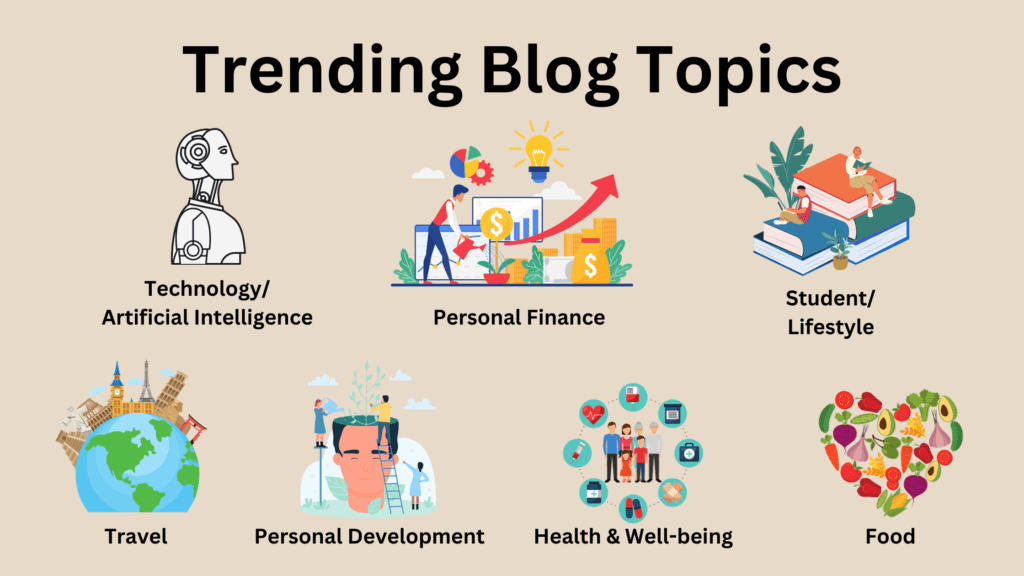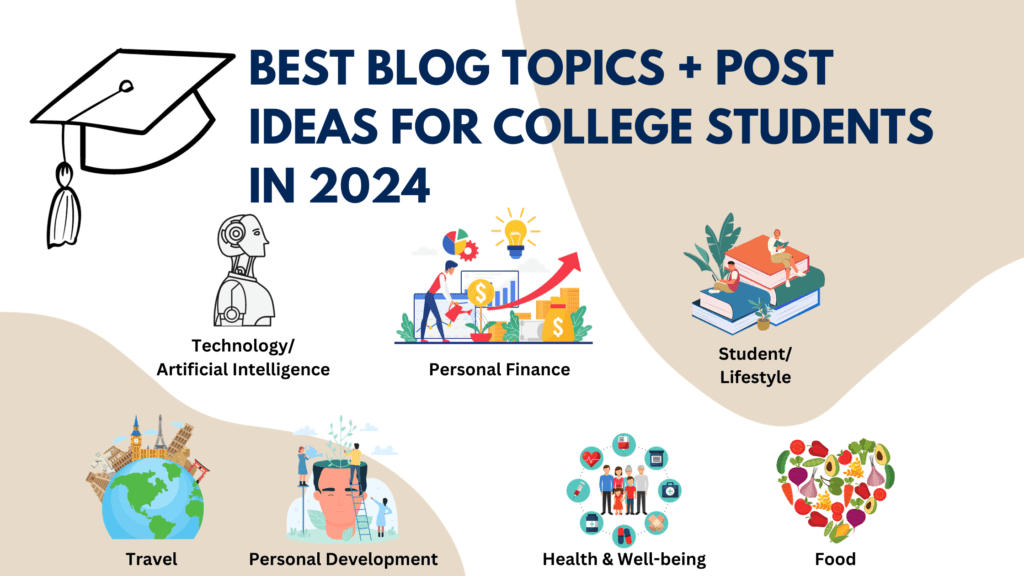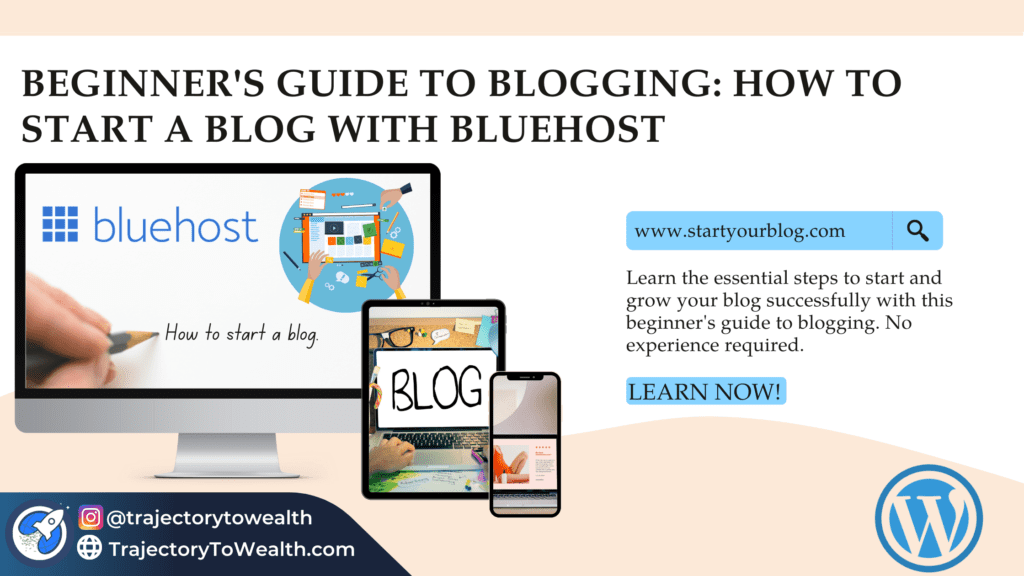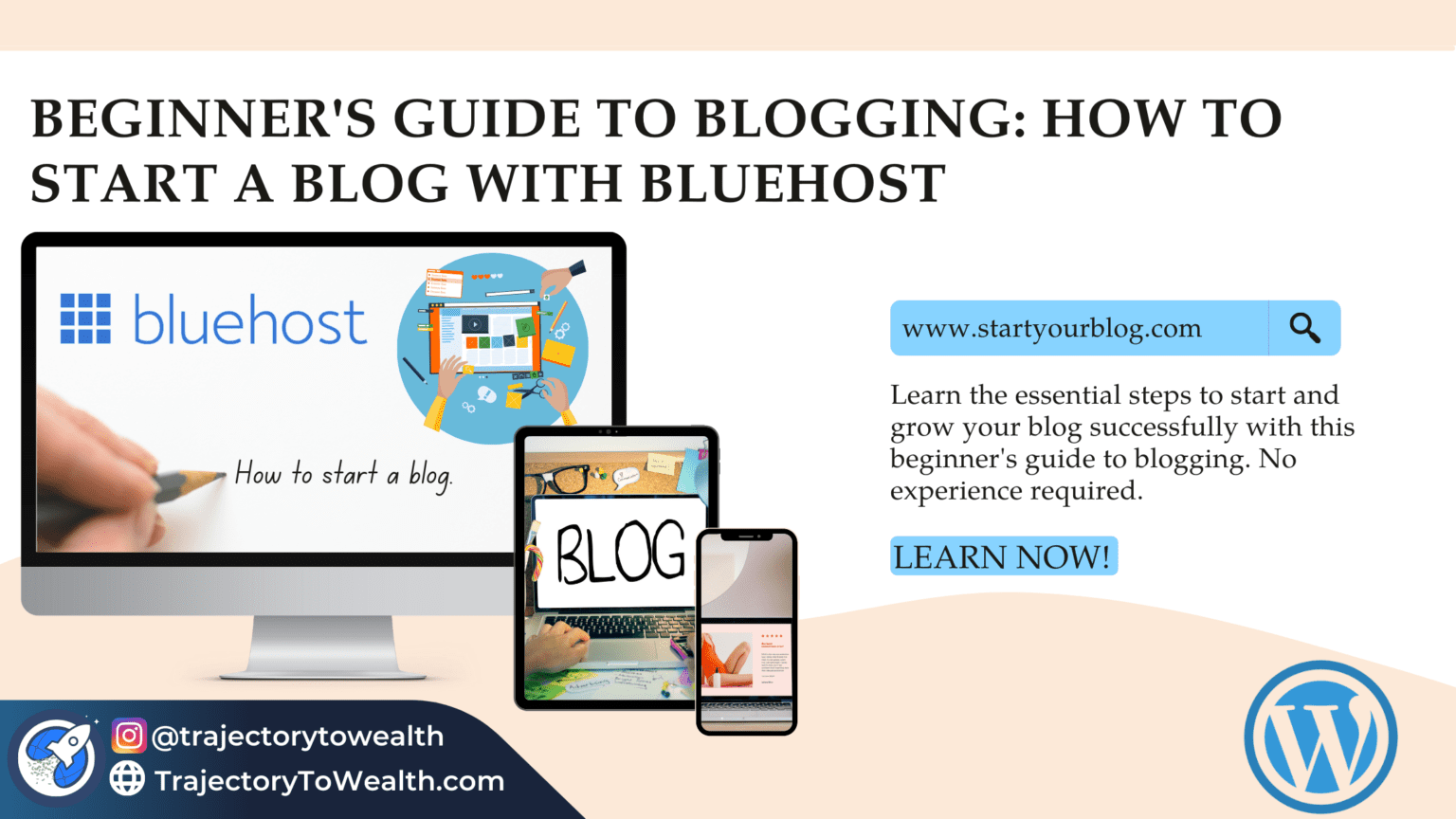Are you a college student eager to dive into the exciting world of blogging? You’re in the right place! In 2024, finding the best blog topics for college students is essential for aspiring bloggers looking to make their mark. Whether you’re passionate about sharing your college experiences, offering academic advice, or exploring creative niches, this comprehensive guide will help you discover the most engaging and relevant blog ideas.
Ready to Apply What You Learn? Start Your Blog Today!
If you're eager to apply the valuable insights you'll gain from this post and kickstart your own blogging journey, look no further. Our comprehensive guide on How to Start a Blog with Bluehost has everything you need to get started. From selecting the perfect domain to crafting engaging content, we'll walk you through every step. Don't miss this opportunity to turn your blogging dreams into reality.
Ready to dive in?
Explore In-Depth Insights
Discover a wide range of engaging blog topics tailored for college students in 2024.
Introduction: The Right Blog Topics Can Transform Your College Journey
If you’re a college student looking for the perfect way to express yourself, share your experiences, or even make some extra cash, you’re in the right place.
Blogging is not just a hobby; it’s a powerful tool that can enhance your college life in ways you’ve never imagined.
But hold on a second—before you dive into the blogging world, let’s talk about the cornerstone of a successful blog: choosing the right blog topics for college students.
Why the Right Topics Matter
Selecting the right blog topics is like choosing the right major—it sets the trajectory for your entire college experience.
You want topics that resonate with your fellow students, topics that are not only engaging but also enriching.
You might be wondering, “Why should I listen to you?”
Well, aside from my six-plus years navigating the labyrinth that is higher education, I’ve also spent considerable time in the blogging sphere.
I’ve seen what works and what doesn’t, and I’m here to offer you a list of blog topics that are not just popular but also incredibly relevant to your life as a college student.
The Essence of Contextual Blogging
You’re probably now asking yourself: “Why does it matter what I blog about? It’s my blog, after all.”
That’s true, but if you’re aiming to make an impact, you need to be strategic.
Contextual blogging is not just about writing what you know; it’s about writing what your audience—college students like you—wants to read.
And that’s where the magic happens.
What This Guide Offers
In this guide, you’ll find a curated list of blog topics that resonate with the college experience.
Whether you’re into academics, lifestyle, or even food blogs, we’ve got something for everyone.
By the end of this post, you will have all you need to really capture the essence of a student’s life.
Stay tuned as we delve deeper into the best blog topics for college students that will not only make your blog a hit but also enrich your college life in various ways.
Why Blogging is a Great Way to Enhance Your College Experience
So, you’re intrigued by the idea of blogging, but how exactly can this benefit you as a college student?
Well, let me tell you, blogging is not just a great way to enhance your college experience; it’s a golden opportunity to grow both personally and academically.
Let’s dive into the myriad of different ways blogging can enrich your life during these transformative years.
A Platform for Personal Development
First off, blogging offers a unique platform for personal development.
Remember those late-night conversations with roommates about life, career opportunities, and the future?
Well, a blog can serve as an extension of those thought-provoking discussions.
It’s a space where you can explore various topics, from academic writing to mental health topics, and even share tips on time management.
Networking and Building Relationships
College is a time to meet new friends, but it’s also a time to build your professional network.
Blogging can help you do both.
By writing about relevant topics like internship tips, study blogs, or blogs about how high school students can prepare for university, you can attract like-minded individuals and even catch the eye of potential employers or mentors.
It’s an excellent way to make your college years more productive and fulfilling.
Academic Advantages
Believe it or not, blogging can also offer academic advantages.
How?
By improving your writing skills, for one. The more you write, the better you get.
And let’s not forget, good grades often hinge on your ability to express yourself clearly and convincingly in essays and assignments.
Blogging regularly can be your secret weapon for acing those academic challenges.
Financial Perks? Yes, Please!
We all know college costs can be overwhelming. From student loans to textbooks, every dollar counts.
Blogging can be an avenue for generating extra money through affiliate links or sponsored posts.
It’s not just a great idea; it’s a practical real life opportunity that can ease the financial burden of your college years.
A Creative Outlet for Stress Relief
Let’s face it; college can be stressful. Between campus life, classes, exams, and social events, it’s easy to feel overwhelmed.
Blogging serves as a creative outlet where you can express yourself freely, providing a much-needed break from the rigors of academic life.
Your Blog, Your Rules
The best part? It’s your blog, and you make the rules.
Whether you’re interested in food blogs, a travel blog, or even video games, there is a type of blog for everyone – the sky’s the limit.
You can explore a wide range of topics that interest you, making your blog a true reflection of your college experience.
Types of Blogs That Resonate With College Students
Alright, now that we’ve established why blogging is such a game-changer for your college experience, let’s get down to the nitty-gritty: What types of blogs should you consider starting?
The different options for blogs that resonate with college students are as diverse as the student body itself.
From lifestyle and study tips to personal finance and mental health, the blogosphere is your oyster.
Let’s explore some of the most popular blog topics and blog posts that can make your blog a hit among your fellow students.

Lifestyle and College Life Blogs
Lifestyle blogs are the bread and butter of the college blogging scene.
They cover everything from dorm room essentials to navigating the social aspects of college life.
Think of them as your virtual campus tour, offering a complete guide to making the most of your college years.
This is one of the best topic ideas if you’re planning to produce content aimed at new students, prospective students or international students since they are likely seeking information about college lifestyle.
Study and Academic Blogs
For those of you who are academically inclined, study blogs offer a wealth of information.
They provide study tips, time management strategies, and even templates for note-taking.
It’s like having a personal tutor at your fingertips, helping you achieve those good grades.
Personal Finance Blogs
Let’s be honest, managing finances in college can be a daunting task.
So it’s a great thing personal finance blogs exist.
Personal finance blogs offer actionable advice on budgeting, saving, and even investing. It’s exactly what my blog, Trajectory To Wealth focuses on.
They’re an excellent way to get a handle on your student loans and make some extra money on the side.
Most importantly, personal finance blogs are perhaps the best place to educate yourself about how to build long-term wealth.
And as a college student, you typically have one thing that most other people don’t have. Time.
Time is your strongest ally when it comes to building wealth, so if you can ignite your financial fire early on in college, you’ll be destined to secure a wealthy retirement.
Health and Wellness Blogs
College can be stressful, and maintaining good mental and physical health is crucial.
Health and wellness blogs offer tips on everything from exercise routines to mental health topics.
They’re your go-to source for staying fit and sane amidst the chaos of college life.
Career and Internship Blogs
As you approach the end of your college journey, thoughts about your professional career start to take center stage.
Career and internship blogs offer invaluable advice on resume building, interview techniques, and even job hunting.
They’re your roadmap to a successful transition from college to the professional world.
Special Interest Blogs
Whether you’re into video games, travel, or cooking, there’s a blog niche for you.
Special interest blogs allow you to dive deep into your passions and share them with like-minded individuals.
They’re a great way to connect with people who share your interests and can even open doors to new opportunities.
If you have a special interest in a topic not listed here, then that may be the perfect first blog topic you focus on.
At the end of the day, people want to read engaging, well-written content. If you are passionate about what it is you’re writing about, it will be so much easier to tick both those boxes.
How to Generate Great Blog Ideas
So, you’re sold on the idea of blogging and you’ve even got a sense of the types of blogs that resonate with college students.
But now comes the tricky part: How do you generate great blog ideas that will captivate your fellow students?
Don’t worry, I’ve got you covered.
Let’s delve into some strategies and tools that can help you come up with blog ideas that are not just good, but great!
Start with What You Know
The best blog ideas often come from your own experiences and interests.
Whether it’s your passion for video games or your knack for budgeting, your personal experience is a treasure trove of potential blog topics.
So, take a moment to jot down what you’re passionate about and how it relates to your college life.
Think about what really makes you excited. What value could you add to your readers by sharing your experiences and insights? Take a step closer to becoming a successful college blogger by brainstorming your unique blog topics
Leverage Online Tools
There are several online tools designed to help you generate blog ideas.
For instance, Google Trends can give you insights into what topics are currently popular.
HubSpot’s Blog Ideas Generator is another excellent tool that can spark your creativity.
These tools are packed with features that can help you find good blog topics that are relevant to your audience.
Listen to Your Audience
One of the best ways to come up with great blog ideas and new topics is to listen to your fellow students.
What are they talking about? What questions do they have?
Platforms like Quora, Reddit, or even the comment section of your own blog can be goldmines for topic ideas.
Better yet, attending college events or a social event and engaging in diverse conversations with your peers will give you instant insights.
Conduct Keyword Research
Keywords aren’t just for SEO; they can also help you generate blog ideas.
Use tools like Google Keyword Tool to find keywords related to your niche.
Or if you’re really committed, you can use a paid keyword research tool like RankIQ to really maximize choosing the right topics to talk about that Google ranks highly.
This will not only help you come up with content ideas but also ensure that your posts are SEO-friendly, ensuring they get seen by a wide audience.
Keep an Idea Journal
Inspiration can strike at any time. Keep a journal or use a note-taking app to jot down any blog ideas that come to you.
Over time, you’ll have an extensive list of potential topics to choose from.
It’s an easy task to do, but it can yield exceptional results over the long run.
Explore Different Content Formats
Don’t limit yourself to just articles.
Consider different types of blog posts like case studies, interviews, or even video blogs.
Mixing up your content not only keeps your blog fresh but also appeals to different segments of your audience.
Utilizing Social Media for Inspiration
Now that you’ve got some tools and strategies under your belt for generating blog ideas, let’s talk about another fantastic source of inspiration for blog topic ideas: social media.
As a college blogger, you’re probably already spending a good amount of time scrolling through your feeds.
But have you ever thought about using social media as a tool for blog inspiration? Trust me, it’s a good idea.
Here’s how:
Follow Accounts That Inspire You
Start by following accounts that resonate with your interests and the college life you’re experiencing.
There’s an abundance of social media platforms out there that you can use to acquire inspiration. Instagram, Linkedin, TikTok, Twitter (or is it X now?). You know them better than I would now, so use them to your advantage!
Whether it’s motivational speakers, fellow student bloggers, or even academic institutions, these accounts can offer a wealth of ideas for your next blog posts.
Engage with Your Community
Social media is not just about passive consumption; it’s also about engagement.
Join groups or forums related to your blog niche. This is how you will keep updated with the latest news relevant to your blog.
Ask questions, share your own experiences, and listen to what your fellow students are saying.
This interaction can spark some great ideas for your new blog.
Monitor Trends and Hashtags
Keep an eye on trending topics and hashtags relevant to college students.
These trends can offer a glimpse into what your target audience is currently interested in, providing you with timely and relevant blog topics.
Beyond that, use trends to structure your blog posts. Drive engagement to your new post by crafting a blog title that uses trending topics.
Staying up to date and incorporating these trends into your posts is how you will acquire more and more traffic to your blog.
Leverage Instagram and Pinterest for Visual Ideas
Sometimes, a picture is worth a thousand words. Platforms like Instagram and Pinterest are excellent for visual inspiration.
From study room setups to travel blogs, these platforms can offer a different perspective on potential blog topics.
Use Social Media Analytics
Most social media platforms offer analytics that can help you understand what content resonates with your audience. Use this data to tailor your blog topics and create content that your fellow students will love.
The Role of Personal Experience in Blogging
So, you’ve got your blog ideas, and you’re ready to start writing.
But wait.
There’s one more crucial element that can make your blog posts not just good, but great.
I’m talking about the role of personal experience in blogging.
As someone who’s been through the rigors of college life and beyond, I can’t stress enough how vital it is to infuse your posts with your own experiences.
Why Personal Experience Matters
You see, personal experience adds a layer of authenticity to your blog that no amount of research can replicate.
It’s the secret sauce that makes your posts relatable to current students and anyone who’s been in your shoes.
When you share your own stories, you create an emotional connection with your readers, making your blog not just another page on the internet but a community where people feel understood and supported.
How to Incorporate Personal Experience
- Be Genuine: Share your triumphs, but also your struggles. College life isn’t always a bed of roses, and your readers will appreciate your honesty.
Be Relevant: Make sure your personal anecdotes are directly related to the blog topic. For instance, if you’re writing about study tips, share your own tried-and-true methods.
Be Relatable: Use your experiences to offer solutions or new perspectives to your readers. Your personal experience can serve as a case study that others can learn from.
The Power of Storytelling
Storytelling is an art, and when done right, it can be incredibly captivating.
Your personal experiences are your stories, and sharing them in a compelling way can make your blog posts unforgettable.
So, don’t shy away from using vivid details, emotional highs and lows, and even a touch of humor to make your stories come alive.
The Benefits of Sharing Personal Experiences
Builds Trust
When you open up about your own life, you build trust with your readers.
Adds Depth
Your personal experiences add layers of complexity, making your content richer and more nuanced.
Enhances Engagement
Personal stories are more likely to be commented on, shared, and remembered.
Career Opportunities Through Blogging
We’ve talked about the types of blogs that resonate with college students, how to generate great blog ideas, and even the importance of incorporating personal experiences.
But let’s not forget one of the most compelling reasons to start a blog during your college years: the career opportunities and personal development that come with it.
Blogging as a Stepping Stone
Think of your blog as more than just a creative outlet; see it as a stepping stone to your next step in life.
Whether you’re eyeing a career in journalism, marketing, or even entrepreneurship, blogging can serve as a practical training ground.
It’s a great way to hone your writing skills, learn about SEO, and even understand the basics of running a small business.
Networking and Building Connections
Blogging opens doors to new friends and professional connections. You’ll find yourself interacting with fellow students, industry experts, and even prospective employers.
These connections can be invaluable when it comes to internships, job placements, and other career opportunities.
Personal Development Through Blogging
- Time Management: Juggling between college life and blogging teaches you valuable time management skills.
- Communication Skills: Crafting blog posts improves your ability to articulate thoughts clearly and persuasively.
Financial Literacy: If you decide to monetize your blog, you’ll get a crash course in managing finances, which is an excellent way for personal development.
The Long-Term Benefits
Portfolio Building: Your blog serves as a live portfolio that showcases your writing skills, creativity, and expertise.
Passive Income: With the right strategies, your blog can become a source of extra money, helping you pay off those pesky student loans or cover college costs.
Career Advancement: Many employers value the skills and discipline required to run a successful blog, making you a more attractive candidate in the professional career landscape.
Financial Benefits of Blogging: A Lifeline for College Students
We’ve covered a lot of ground—from the types of blogs that resonate with college students to the nitty-gritty of career opportunities.
Now, let’s talk about something that’s on every college student’s mind: money.
Specifically, how blogging can help you earn that much-needed extra money to manage your student loans and even turn your blog into a small business.
Say Goodbye to Student Loans
One of the best parts about blogging is the potential for financial freedom.
With strategies like affiliate marketing, sponsored posts, and even selling digital products, you can start chipping away at those daunting student loans.
Imagine graduating from college with not just a degree but also a smaller debt burden.
Sounds like a dream, right?
Diversify Your Income Streams
Blogging offers various ways to earn extra money. You can monetize through:
Affiliate Links: As we discussed earlier, this is an excellent way to earn commissions by promoting products you believe in.
Sponsored Posts: Companies pay you to write about their products or services. It’s a win-win situation—you get paid, and they get exposure.
Digital Products: E-books, courses, and printables can be sold directly from your blog, turning it into a small business.
The Small Business Potential
If you’re serious about blogging, there’s potential to turn it into a full-fledged small business.
You can register your blog as a business entity, which opens doors to business loans, tax benefits, and even hiring employees in the future.
It’s not just a blog; it’s your brand, your business, and potentially, your primary source of income.
Time Management and Financial Planning
Blogging teaches you valuable skills in time management and financial planning.
You’ll learn how to budget your earnings, plan for taxes, and even invest in growing your blog.
These skills are not just applicable to your blog but also to your personal financial management.
Affiliate Marketing for Students: Turn Your Blog into a Goldmine
So, you’ve got the financial benefits of blogging down, and you’re excited about the prospect of turning your blog into a small business.
Now, let’s dive into one of the most lucrative ways to monetize your blog: affiliate marketing.
This strategy is an excellent way to generate income without any extra cost to you or your readers.
What is Affiliate Marketing?
In simple terms, affiliate marketing involves promoting products or services on your blog and earning a commission for every sale made through your unique affiliate links.
It’s an excellent way for college students to generate some extra money without a lot of time investment.
Why Affiliate Marketing is an Excellent Way for Students
Affiliate marketing is particularly beneficial for college students for several reasons.
First, it’s an excellent way to monetize your blog without going through the hassle of creating your own products.
Second, it allows you to recommend products that you genuinely believe in, enhancing your blog’s credibility.
How to Get Started with Affiliate Marketing
- Choose the Right Affiliate Programs: Look for programs that align with your blog topics and interests. This is the first time you’re diving into affiliate marketing, so choose wisely.
- Use Your Affiliate Links Wisely: Don’t just randomly place links in your posts. Contextualize them within your content so that they add value to your readers.
Disclose Your Affiliations: Transparency is key. Always disclose that you’re using affiliate links to maintain trust with your readers.
Case Studies of Successful Student Bloggers
Now that we’ve explored the myriad of career opportunities that blogging can offer, let’s delve into some real-life case studies that illustrate the transformative power of blogging in student life.
These inspiring stories of successful blogs serve as tangible proof that blogging can be a game-changer in your academic and professional journey.
The Digital Photography School Phenomenon
Meet Darren Rowse, the brain behind Digital Photography School.
What started as a humble blog to share photography tips has now grown into a full-fledged business.
Darren began his journey in 2006 and has since amassed over a million RSS/email subscribers.
He initially monetized his blog through advertising and affiliate links before launching eBooks.
PluginID’s SEO Success
Glen Allsopp started PluginID with a focus on personal development.
Through savvy SEO strategies, he built connections with top bloggers in his industry and became the 10th largest personal development blog.
Eventually, he sold it for a five-figure sum.
UnMarketing and the Power of Social Media
Scott Stratten used his blog, UnMarketing, along with a Twitter account to build an impressive profile. Forbes.com named him one of the top 5 social media influencers in the world.
Mint.com’s Content Strategy
Mint.com used blogging to stand out from competitors by establishing themselves as a smart resource with high-quality content.
They used infographics to engage readers and convert them into buyers of their product.
Within three years, they sold to Intuit for over $170 million.
The Amazing Adventures of Diet Girl
Shauna Reid chronicled her weight loss journey through her blog, which led to a book deal with Harper Collins in 2008. Her story shows that blogs can serve as a live portfolio that attracts significant opportunities.
Time Management for Student Bloggers: Juggling Academics and Blogging Like a Pro
So far, we’ve talked about the financial benefits and even delved into the world of affiliate marketing.
But let’s address the elephant in the room: time management.
As a college student, you already have a lot on your plate—classes, assignments, social events, and maybe even a part-time job.
So, how do you find the free time to manage a blog? Let’s break it down.
Prioritize Your Tasks
First things first, you need to prioritize. Make a list of all your academic responsibilities and blogging tasks.
Use tools like Google Calendar or a good old-fashioned planner to allocate specific time slots for each task.
Remember, good time management starts with knowing what needs to be done and when.
The Pomodoro Technique: A Student Blogger’s Best Friend
The Pomodoro Technique involves working in bursts of focused time (usually 25 minutes) followed by short breaks.
This method is excellent for student bloggers as it allows you to balance academic writing with blog writing without feeling overwhelmed.
Use Your Free Time Wisely
Got a free period between classes? Use that time to jot down blog ideas or even write a quick draft.
The key is to utilize every bit of free time you have. Turn those idle moments into productive blogging time.
Automate and Schedule Posts
Automation tools can be a lifesaver. Use platforms like WordPress to schedule your posts in advance.
This way, even if you’re swamped with academic responsibilities, your blog remains active.
The Importance of Mental Health
Blogging should be a fun and enriching experience, not a source of stress. Make sure to allocate time for relaxation and self-care. After all, a healthy mind is crucial for both academic and blogging success.
Conclusion: The Ultimate Guide to Elevating Your College Experience Through Blogging
Wow, what a journey we’ve been on together!
From understanding the importance of choosing the best blog topics for college students to diving into the nitty-gritty of time management, we’ve covered a lot of ground.
So, what’s the best part of all this?
It’s the realization that blogging can be a transformative experience for college students in so many ways.
The Power of the Right Blog Topics
Choosing the best blog topics is more than just a good idea—it’s a game-changer.
It’s the cornerstone of a successful blog that not only resonates with your fellow students but also offers real value. Whether it’s academic life, personal development, or even career opportunities, the right topics can make all the difference.
The Financial and Personal Benefits
We’ve discussed how blogging can help you manage student loans, earn extra money, and even pave the way for a small business. But beyond the financial gains, blogging is an excellent way for personal development. It enhances your writing skills, offers a platform for self-expression, and can even improve your academic performance.
Your Ultimate Guide to College Blogging
Consider this post your ultimate guide to college blogging. From time management tips to affiliate marketing strategies, we’ve provided a complete guide to help you succeed. It’s your one-stop-shop for everything you need to know to make the most of your college experience.
The Best Part? The Journey is Just Beginning
The best part of all this is that your blogging journey is just getting started. With the right strategies and a bit of dedication, who knows where this path might lead? Perhaps to a professional career, a thriving small business, or even to becoming an influencer in the world today.
Don’t forget, if you’re eager to start your blogging journey right away, our comprehensive guide on How to Start a Blog with Bluehost has you covered. It’s the perfect resource to help you take that first step towards a successful blogging adventure.
Beginner’s Guide to Blogging: How to Start A Blog With Bluehost [2025 Guide]
Start a blog with Bluehost: Our beginner's guide covers niche selection, plugins, & account setup. Launch your blogging journey today!
FAQ about Blog Topics for College Students
Your Burning Questions Answered
We’ve covered a lot of ground, from choosing the right blog niche to exploring the most popular blog topics for college students.
But you might still have some questions.
That’s why we’ve put together this FAQ section to address some of the burning questions you may have.
The best topics to blog about are those that align with your interests and expertise. Whether it's student life, academic success, or budget living, choose a topic that you're passionate about and that has a demand among your target audience.
Students can write about a variety of topics, from study tips and career advice to personal experiences and campus events. The key is to choose topics that resonate with your audience and provide value.
College students read blogs that offer practical advice, tips, and solutions to their everyday challenges. Topics range from academic success and career planning to personal development and lifestyle.
Personal Development: Blogging helps students improve their writing skills, express their thoughts, and connect with a like-minded audience.
Career Opportunities: A well-maintained blog can serve as a portfolio, showcasing your skills and experiences to potential employers.
Blogging can significantly aid in academic growth by improving writing skills, encouraging research, and providing a platform to explain complex subjects in simpler terms.
Monetization strategies vary, but popular methods include affiliate marketing, sponsored posts, and selling digital products or services.
Effective ways to drive traffic include SEO optimization, social media promotion, and networking with other bloggers in your niche.
Time management is key. Create a blogging schedule that doesn't interfere with your academic responsibilities.
There are various tools for keyword research, content creation, and analytics that can make the blogging process more manageable. RankIQ is one of the best tools for beginners.
Engaging your audience involves creating high-quality content, interacting on social media, and responding to comments and queries on your blog.
Absolutely! Blogging can help you connect with industry experts, potential employers, and peers who share similar interests.






